
batrabies@onehealthcommission.org
Our Mission is to raise awareness about bat rabies in the Americas by promoting health education in a multi-strategic One Health approach.
More than 59,000 people around the world die each year from rabies.
Rabies is a deadly, yet preventable, viral disease that can be transmitted to people by infected mammals, including bats. Bats are an integral part of our ecosystem, serving important roles like pollination, seed dispersal, and eating disease-causing mosquitoes and crop-destroying insects. Not all bats have rabies (most don't), but bats are responsible for most human cases of rabies in the Americas. Yet many people are not aware of the health risk that bats can pose to humans and pets through the potential transmission of the rabies virus.
Often people in the Americas who have 'died' from bat rabies were unaware that they had been bitten by a bat. There are some key considerations that the public should be aware of regarding contact with bats. Learn more in this video about bats and rabies.
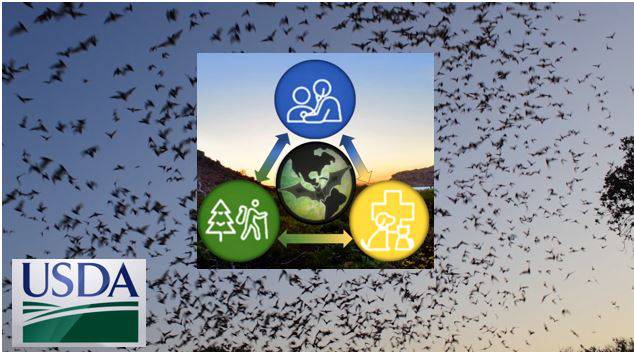
Video about Bats and Rabies
The One Health Commission Bat Rabies Education Team (BRET) is pleased to provide this webpage of educational resources and free downloadable educational posters (in English, Spanish, and Portuguese) to help get the word out about protecting bats while recognizing the potential for them to transmit rabies to humans and pets (see below).
Slide presentation about BRET
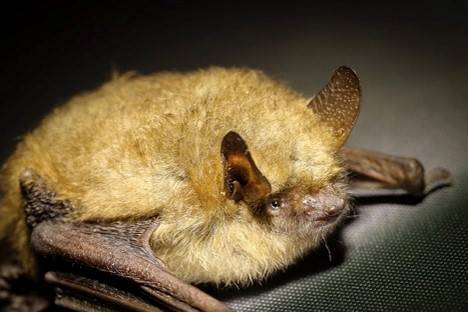
You can’t tell if a bat has rabies just by looking at it!
Rabid bats may exhibit none, some, or all of the following behaviors:
- Daytime activity
- Inability to fly
- Flopping on ground
- Unusual sounds such as hissing
- No fear of people
You can get rabies from a bat bite or scratch!
- If you get bitten or scratched by a bat, wash the wound with soap and see a doctor immediately.
- You should also contact your local health department.
- You can be bitten or scratched by a bat and not realize it. The size of a bite wound can be very small.
- If you find a bat indoors, don’t let it go. Instead, contain it in the room you found it in by closing all exits. Then, contact your local health department and animal control.
If possible, call your local animal control. Do not try to remove the bat yourself unless you are visiting a remote cabin and there is absolutely no alternative!
See - How do I remove a bat from my home?
Help PREVENT rabies from bat bites or scratches!
- Keep your pet’s rabies vaccine current at all times. There can be serious consequences (including euthanasia depending on your local laws), if your pet is not current on the rabies vaccine and is exposed to a rabid animal.
- Avoid contact with all wild animals especially bats, raccoons, skunks, foxes,
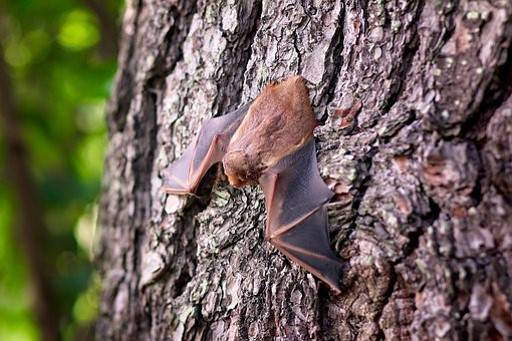 coyotes or bobcats, all species that are occasionally infected with rabies. If you can touch a wild animal, there is something terribly wrong.
coyotes or bobcats, all species that are occasionally infected with rabies. If you can touch a wild animal, there is something terribly wrong.
- If you find a bat in your home, don’t let it go! Contact your local health department and animal control.
- Always seek medical attention immediately if you are bitten, scratched, or have a close encounter with a bat.
Be sure your pets are current on Rabies vaccination. It’s one of the most important things you can do to protect both you and your pet.
We need bats! Please protect them and Do Not harm them!
They serve many important roles in our ecosystems, in addition to being incredibly fascinating creatures.
- They eat lots of insects!
- Mosquitoes which can spread diseases
- Crop - damaging insects, providing a huge economic benefit to agriculture
- They can serve as pollinators for a variety of fruits and nuts.
- Some bats can also spread seeds.
- Bats are the only mammals that can fly.
- Bats use echolocation (also called bio sonar) for moving about and hunting prey
Learn more about the importance of bats with these additional resources:
April 17 is National Bat Appreciation Day
13 Awesome Facts about Bats
New York Times December 11, 2020 Opinion Piece by David Quaman: The Virus, The Bats, and Us
New York Times April 13, 2018 Op-Ed article: Fighting to Save America’s Bats
EcoHealth Alliance article: In a World Without Bats;
Living Safely with Bats: A One Health Educational Resource - USAID PREDICT Project Picture Book in multiple languages
Porch.com, May, 2021 Commentary by Hermann Somano: Bats inside your home? Here's what you need to know
Spread the Word with these Free Educational Materials!
1. Free, downloadable, educational posters
The One Health Commission, in partnership with the Global Alliance for Rabies Control and Bat Conservation International, has developed educational posters that can be downloaded and shared – for free! They are available in English, Spanish, and Portuguese appropriate for adult and child audiences.
Never Touch a Bat - CHILDREN (English) (Espanol) (Portugues)
Never Touch a Bat - ADULTS (English) (Espanol) (Portugues)
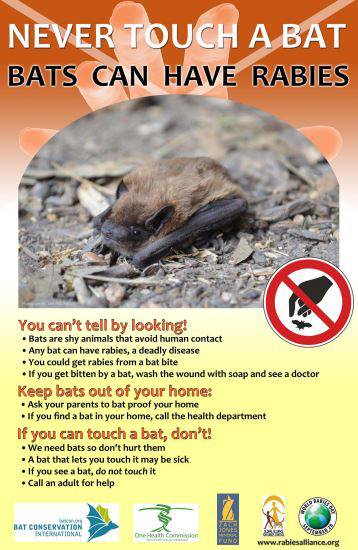
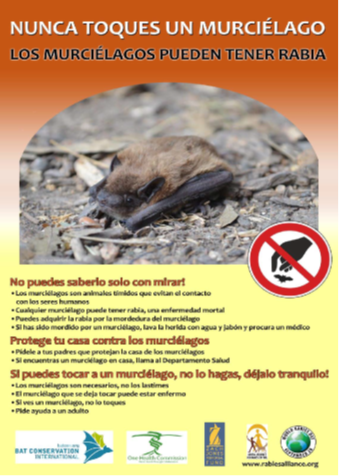
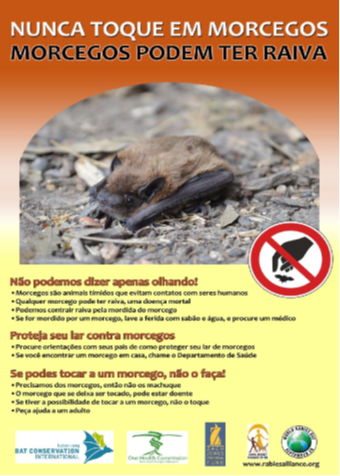
2. Free, downloadable, educational infographics
In 2020 the USDA Wildlife Research Center partnered with OHC BRET to lead a bat rabies infographic contest for Undergrad and Graduate students titled 'Changing the Narrative on Bats and Rabies'. To ensure participating students had a good understanding of issues surrounding bats and rabies, a 5-minute video was prepared. The infographic target audience was K-12 students. The First Place Winner received a $500 cash award and the Runner Up received $100.
See a the USDA blog post about the contest. And the winners are:
|
First Place $500 Award
Brooke MacNeill
Graduate student, College of Veterinary Medicine and Biomedical Sciences, Colorado State University.
Her infographic (English and Spanish) targeted grades 6-12 focusing on the role of bats in the environment and what is being done to prevent rabies in wildlife, pets and people.
|
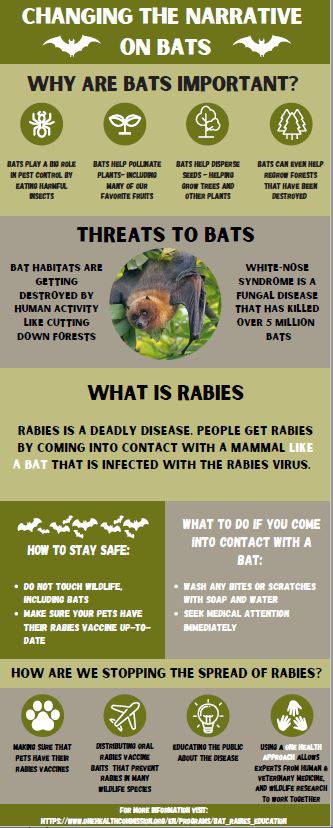
English
|
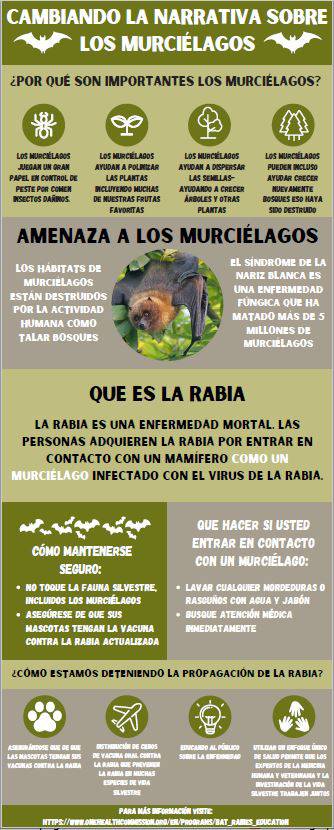
Spanish
|
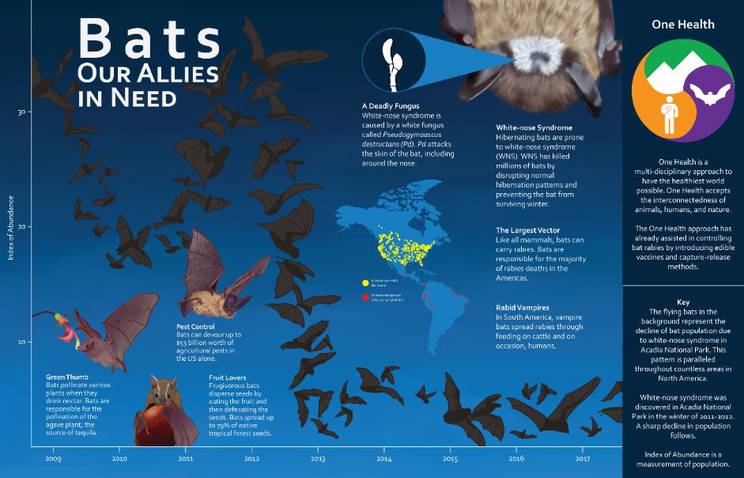
Runner Up $100 Award
Stephen Nachtscheim,
Graduate student, Biomedical Communications, University of Toronto. His design focused on the benefits of bats and their population declines due to various diseases.
|
You can help spread the word about bats, how we need them and how to prevent rabies by downloading and displaying these posters and infographics in your organization, neighborhood, office, school, post office, etc. You can also share with friends and post on social media.
Additional Resources: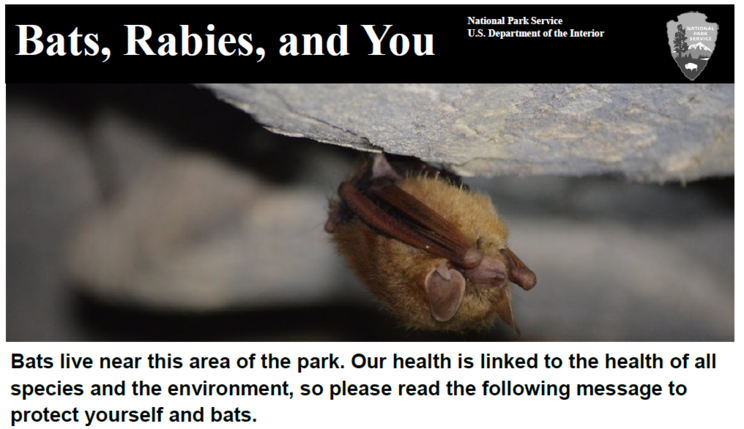
One of the goals of the One Health Commission is to create networks to improve health outcomes and well-being of humans, animals, plants and the environment. With that in mind, BRET hopes to serve as a relevant and timely resource for any individual, group, or organization working to better understand or improve / update their bat rabies resources.
Rabies Risk Assessment: Test Your Knowledge
Challenge yourself with these cases, developed by the US Centers for Disease Control and Prevention (CDC), that illustrate key rabies prevention and treatment situations. Would you know what to do?
Get Involved with BRET!
The Bat Rabies Education Team (BRET) was created in 2016 when the One Health Commission recognized that there was no focused health effort in the Americas to educate children and adults that bats can be infected with and transmit the deadly rabies virus. BRET is comprised of a group of dedicated volunteers who are actively working to promote our mission to raise awareness about bat rabies. If you would like to get involved, BRET always welcomes new team members. For more information, please contact batrabies@onehealthcommission.org.
Bat Rabies Education Team Members
|

|
Co-Chair
Janine Seetahal, DVM, MPH
Biography
|

|
Co-Chair
Clarissa Noureddine, DVM, MS, MS
Biography
|
 |
Peter J. Costa, MPH, MCHES, AVES (Hon)
Volunteer
Biography
|
 |
Jennifer Diethelm, BS, MPH, Fellow, US National BioSafety and Biocontainment Training Program, NIH
Biography
|
 |
Bernadette Dunham, DVM, PhD
Biography
|

|
Juliana Galhardo, DVM, PhD
(Animal Sciences / Zoonoses)
Biography
|
 |
Karen Gruszynski, DVM, MPH, PhD Biography
|
 |
Jennifer Hulsey, RN, BSN, WCC, CPHT Athens Drive Magnate School Science Academy
Biography
|
| |
|
 |
Malathi Raghavan, DVM, MS, PhD, Purdue University
Biography
|








 coyotes or bobcats, all species that are occasionally infected with rabies. If you can touch a wild animal, there is something terribly wrong.
coyotes or bobcats, all species that are occasionally infected with rabies. If you can touch a wild animal, there is something terribly wrong.

















